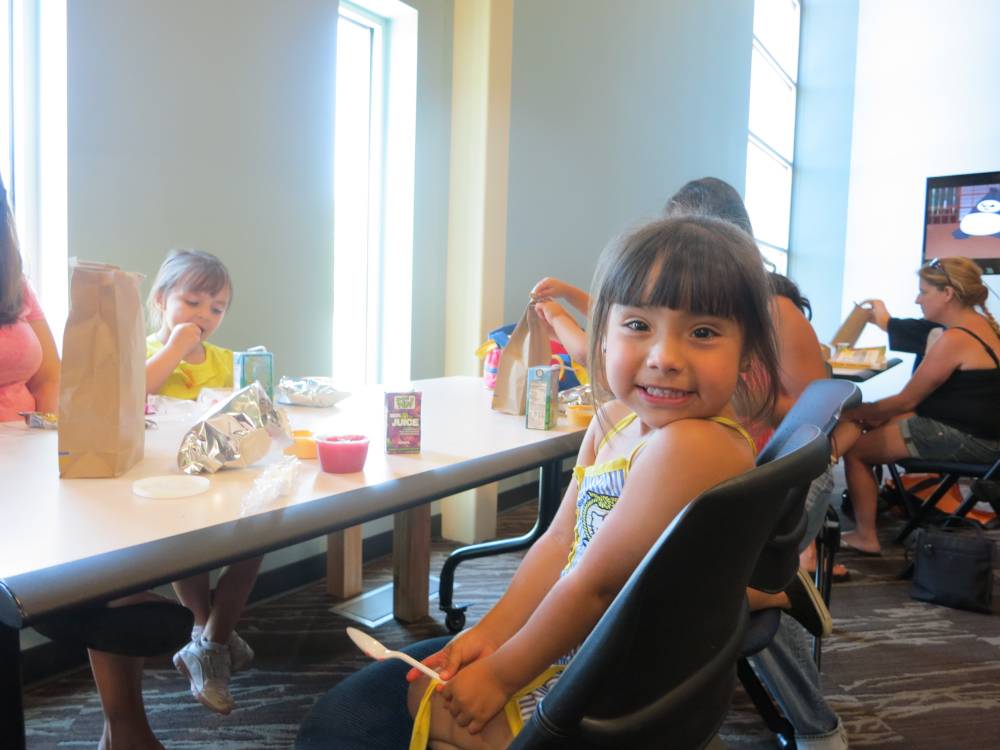Curious minds, full stomachs

Increasing food accessibility in Adams County
If you’ve stepped into a library lately, you already know: they’re about much more than books. As part of its current strategic plan, one of Anythink’s goals is to build communities where people are happy, healthy and safe. Part of that is serving customers in ways that go beyond literacy, including workforce development, creative opportunities, and even access to basic needs. With the help of vital community partners, Anythink is working to increase food accessibility through programs, farmer’s markets and more.
Fueling young minds
In 2017, more than 18,000 children in Adams County lived in households facing food insecurity. A standard created by the United States Department of Agriculture, food insecurity refers to a lack of access to enough food for an active, healthy life, including the availability of nutritionally adequate food.
For kids experiencing hunger, the consequences can impact their physical and mental health, not to mention their education. Recent research conducted by No Kid Hungry, a national non-profit campaign working to solve hunger and poverty, found that 46 percent of children from low-income families say hunger hurts their performance in school, with 12 percent noting that their hunger distracts them from their homework at night. It’s something educators have noticed, as well. The same study finds that teachers observe that their students who experience hunger lose the ability to concentrate, see poor academic performance, and are more likely to have behavioral and disciplinary problems in the classroom.
As Anythink Brighton Guide Catherine Odson puts it, “You can’t have a curious mind with an empty stomach.”
For help during the school year, Anythink families in Adams County can apply for free and reduced-price school meals at their local school. Though this is a significant assistance – 85 percent of children at Adams County School District 14 in Commerce City, for example, qualify for this program – it doesn’t extend beyond school hours. That’s where libraries step in.
In 2013, Anythink began a partnership with the Food Bank of the Rockies to provide kids with supplemental food – both during the school year and summer months – at select branches. Kids who live near Anythink Brighton, Anythink Commerce City and Anythink Huron Street – all locations with significant populations of students on free and reduced-price lunch – can now stop by the library for snacks that will help fuel their bodies and minds.
“Food Bank of the Rockies is passionate about feeding children. In fact, about half of the food we distribute – enough for 155,000 meals each day – feeds kids,” says Erin Pulling, president and CEO of Food Bank of the Rockies. “Anythink provides a safe, caring environment for us to share nourishing meals through our Kids Cafe program. We’re grateful for their partnership and all the opportunities they offer children and families.”
In 2018, Anythink served more than 24,000 meals to kids through this partnership.
At Commerce City, serving food helps support Anythink Youth Services Guide Sheila McNair’s “whole child approach.”
“We strive for the children to be healthy, safe and supported in more ways than just providing reading material,” she says. “Kids learn better with full bellies, and so when kids come to the library after school, they know they will be fed – and then we can move on to the activity of the day. During the summer, we serve meals at 12 pm, which is crucial for kids who spend their entire day at the library.”
 Pick up your veggies when you pick up your holds
Pick up your veggies when you pick up your holds
Even in densely populated areas, finding access to healthy, fresh foods can prove difficult. Food deserts – areas where there is little to no access to healthy and affordable food – are most often found in low-income neighborhoods, communities of color and rural areas. According to “The Grocery Gap,” a 2010 white paper produced by PolicyLink and The Food Trust, this lack of access has major impacts, including increased risks for obesity and chronic diseases.
In 2017, Anythink partnered with Tri-County Health Department, City of Thornton, the American Heart Association and local farmers to pilot a weekly farmer’s market at Anythink Huron Street in Thornton, Colo. In an area designated as less food- and financially secure, the neighborhood surrounding the library has no continuous seasonal farmer’s market or easily accessible grocery stores. Not only is this new market an opportunity to bring fresh produce to a food desert, it also promotes an environment of health. Attendees can learn more about cooking and nutrition through demonstrations by organizations like Hunger Free Colorado and Cooking Matters, obtain health screenings from volunteer nurses and, of course, discover more through health resources available at the library. Additionally, food assistance services like SNAP and WIC are accepted.
The pilot market at Anythink Huron Street was such a success, that a second weekly farmer’s market opened at Anythink Wright Farms in 2019.
“These farmers’ markets have touched many needs in the community,” says Judy Fowler, nutrition manager at Tri-County Health Department. “We add to the sense of community, provide affordable healthy foods for increased food security, affordable and reliable healthy resources, and a sense of diversity with the connections made in this welcoming gathering place for all ages.”
Growing community
When you visit an Anythink library, the first thing you see might be stalks of rising sunflowers, blossoming zucchini and maybe even a beehive. One of the best ways to help increase food accessibility is to make it possible for people to grow their own. At Anythink Commerce City, Anythink Perl Mack and Anythink Wright Farms, you’ll find community gardens and apiaries designed to help individuals grow vegetables and community.
Made possible in partnership with Denver Urban Gardens, a network of more than 170 community gardens throughout the Denver metro area, plots are available to community members for growing organic fruit, vegetables, herbs and flowers. As part of this project, participating branches also offer educational programs, as well as access to organic seeds and seedlings.
In addition to growing and harvesting, the gardens also foster community. Each garden has regular meetings where plot owners help clean the garden, meet one another, and get to know their neighbors. Young gardeners learn about nature and science while adults trade harvests and recipes. Organic friendships form while families get to supplement their groceries with fresh produce. In other words, people are happy, healthy
and safe. ■
Sources: Feeding America, United States Department of Agriculture, No Kid Hungry, PolicyLink, The Food Trust
Send your questions or feedback to ithink@anythinklibraries.org or comment below.

